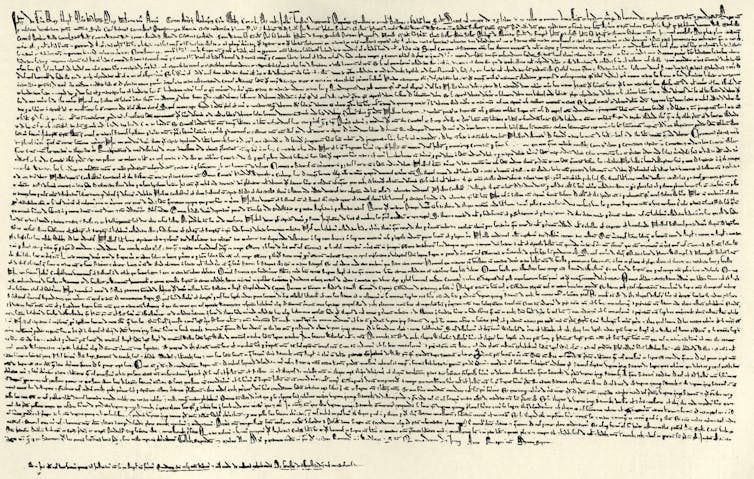
By Jay Rubenstein
Many observers say a controversial U.S. Supreme Court decision from July 1, 2024, turns presidents into kings – but they underestimate how truly radical the ruling actually may be. In fact, though the court’s majority said it was honoring constitutional tradition, it appears to have created something entirely new: a legal tyrant, someone above the law, a privilege even kings never enjoyed.
Specifically, the court ruled that presidents of the United States enjoy “some immunity for official acts” during their terms of office and absolute immunity for acts pertaining to their “core constitutional powers.” Legal scholars are still sorting out what exactly this means and what could be considered an official act.
But criticism was immediate. For instance, Justice Sonia Sotomayor dissented, declared: “In every use of official power, the President is now a king above the law.”
But as a historian of medieval power, I know there is a problem with Sotomayor’s argument. Kings were never above the law. Even the epitome of absolute monarchy, Louis XIV of France, who ruled from 1643 to 1715, did not stand above the law. He embodied the law. Known as “the Sun King,” the law flowed through him and spread over his realm like rays of light. He couldn’t break the law, because he was the law.

Étienne Colaud/Bibliothèque nationale de France via Wikimedia Commons
A narrow distinction
This line between being above the law and the actual embodiment of law is an admittedly fine one. One of the first European thinkers to try to explain this difference with precision was a brilliant 12th-century politician named John of Salisbury.
John wrote that a king is “a law unto himself,” but that at the same time he was “a servant of law.”
According to John, a king would always instinctively place the benefit of the whole community over his own private desires. If he acted otherwise, then he ceased to be a king and became a tyrant. Confusingly, tyrants were, for John, not entirely illicit: God sometimes used tyrants to punish an unrighteous people.
How to respond to a tyrannical king, legally, remained a nearly insoluble problem.
A concrete solution
John of Salisbury’s discussion of these issues stayed on the level of abstraction. However, only a few years after his death in 1180, in England, his theoretical writings became real political concerns. The mercurial King John, who reigned from 1199 to 1216, flirted with tyrannical behavior.
Specifically, he imposed fines on people for the purported crime of making him angry. There was nothing illegal about these fines. They were called “amercements” – literally, you paid money to the king for his mercy, so that he would cease being upset with you. John’s use of the practice, however, was so erratic and so transparently cruel that his barons revolted and threatened to dethrone him in favor of a prince from France.
To pacify the realm, in 1215, King John and the barons negotiated the famous Magna Carta, long regarded as a central document in Western legal tradition, and cited, for example, in more than 170 Supreme Court decisions.
In the Magna Carta, John accepted the barons’ demands that he regularize and limit his use of customary fines, among other punitive practices. To ensure that he would abide by his promises, the Magna Carta further established a council of 25 barons to inform him if he had exceeded his legal authority. If the king did not heed their advice, then “the whole community of the land” was empowered “to distrain and distress” him by attacking his castles and properties and making his life miserable.
The king had never been above the law, and now that concept was enshrined in the law.

Culture Club via Getty Images
A transfer to democracy
Never fully implemented, Magna Carta nonetheless reshaped the culture of the English monarchy.
If John had not died in 1216 during another war with his barons, he would have likely been overthrown. His son Henry III narrowly survived a major rebellion during his reign. In 1326, a disgruntled Parliament and baronage deposed Henry III’s grandson Edward II, who died in prison in 1327.
At the end of the 14th century, the barons and Parliament overthrew Richard II, who likewise died in prison. Never above the law, kings found themselves increasingly constrained both by law and parliamentary practice.
By the time of the American Revolution, English kings had ceded all meaningful authority to Parliament. When Thomas Jefferson railed against George III in the Declaration of Independence, he was using the monarch as a symbol for the English government more generally.
“A Prince whose character is thus marked by every act which may define a Tyrant, is unfit to be the ruler of a free people,” Jefferson wrote in 1776. Despite historical distance and legal difference, John of Salisbury could not have put it better.
Unlike, apparently, future U.S. presidents, kings have never been immune from the law. In their official acts and the exercise of core powers, they have always been defined and constrained by legal precedent.
![]()
Jay Rubenstein is Professor of History and Religion, USC Dornsife College of Letters, Arts and Sciences





























Laurel says
This makes the power of the tyrant much worse than the very government our country was formed to get away from. The so called “Tea Party” Republicans got us into this mess, and we must all vote to keep it from happening.
The ABA (American Bar Association) has formed a Task Force for American Democracy, calling on lawyers, both Republicans and Democrats to work against this action. https://www.americanbar.org/groups/leadership/office_of_the_president/american-democracy/
Samuel L. Bronkowitz says
The french had it right, specifically between the years of 1787 and 1799.
Ray K. says
Maybe we can ask King Charles to take us back and make us part of the UK fold again. Some People know deep in their hearts if Mr. T. wins again we will be like Venazuala. At the end of the 4 yrs. the motto will be, ” If I’m breathin’ I aint leavin’.”
what about.... says
Have we forgotten King Henry VIII? Different circumstances, right? Louis XIV, Queen Elizabeth, Isabella, Victoria, and Catherine the Great. So much history to generalize. Get the point, but there are always exclusions to the rule!!